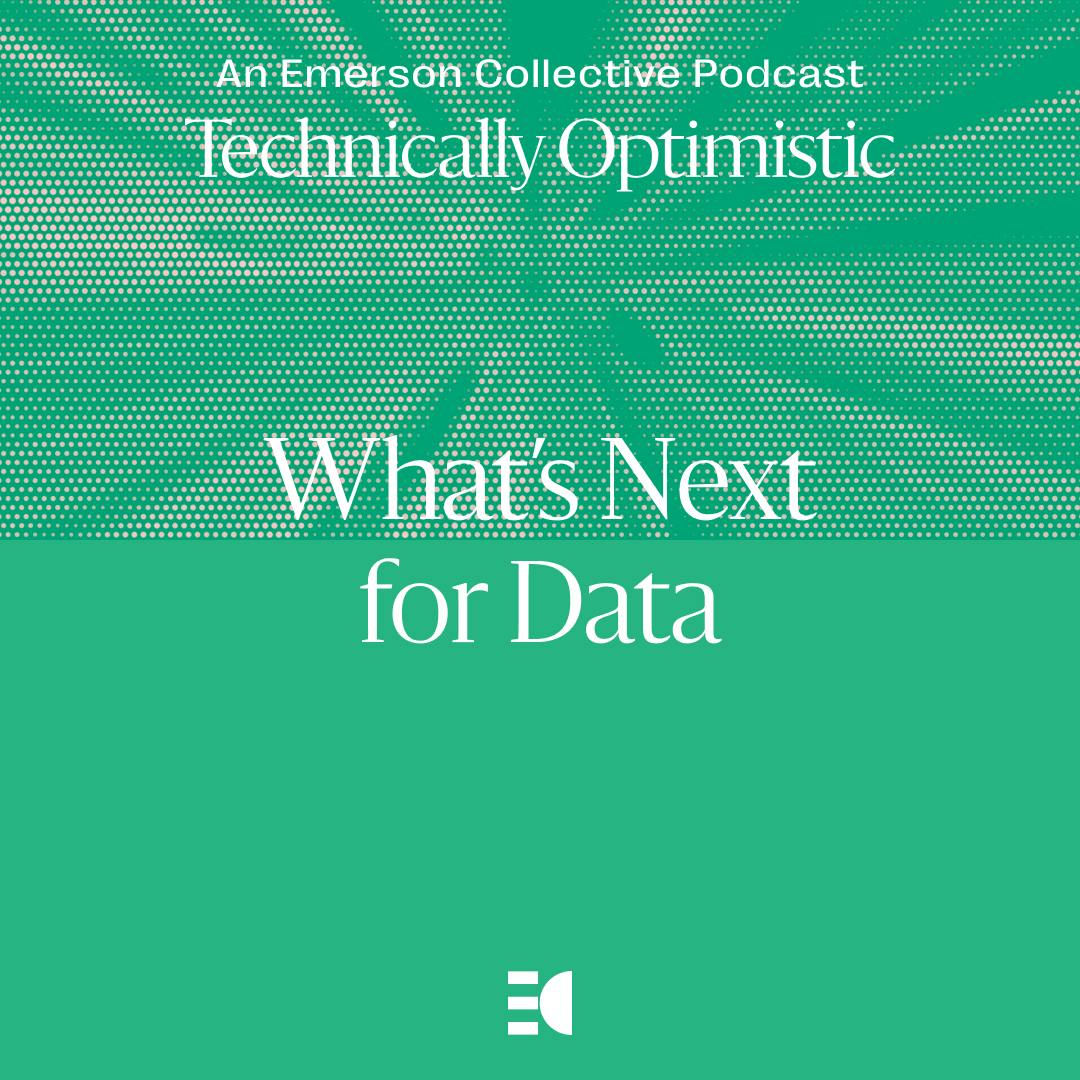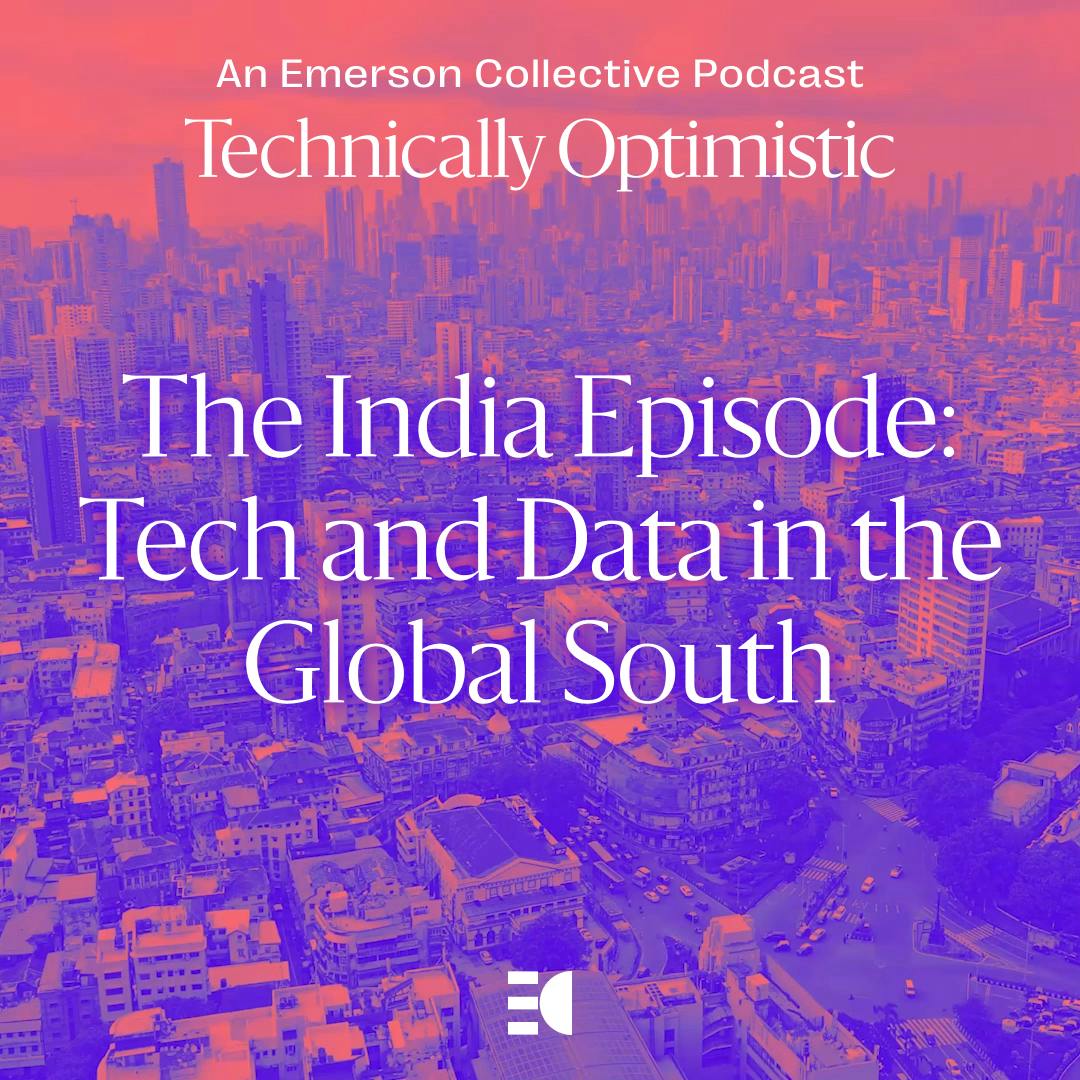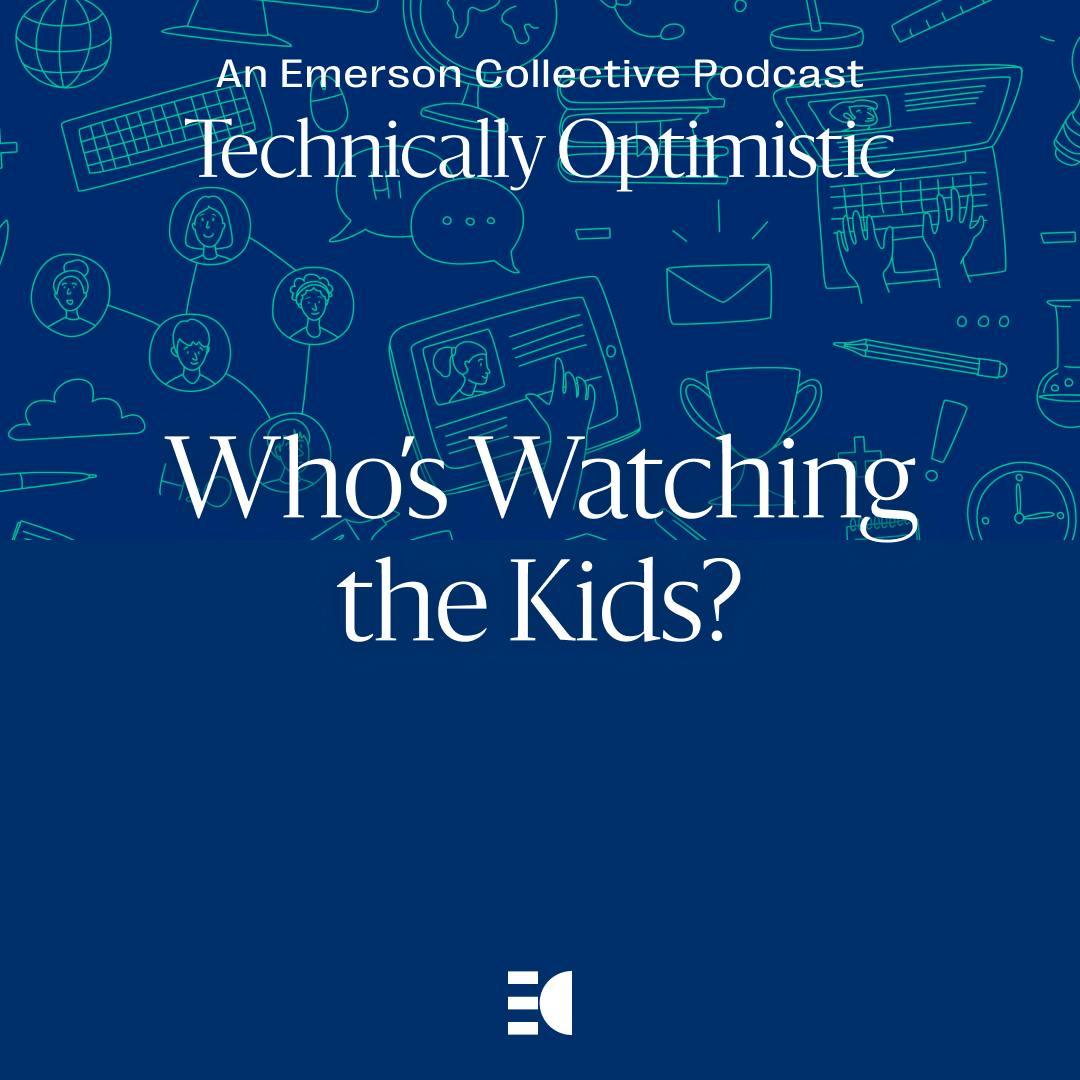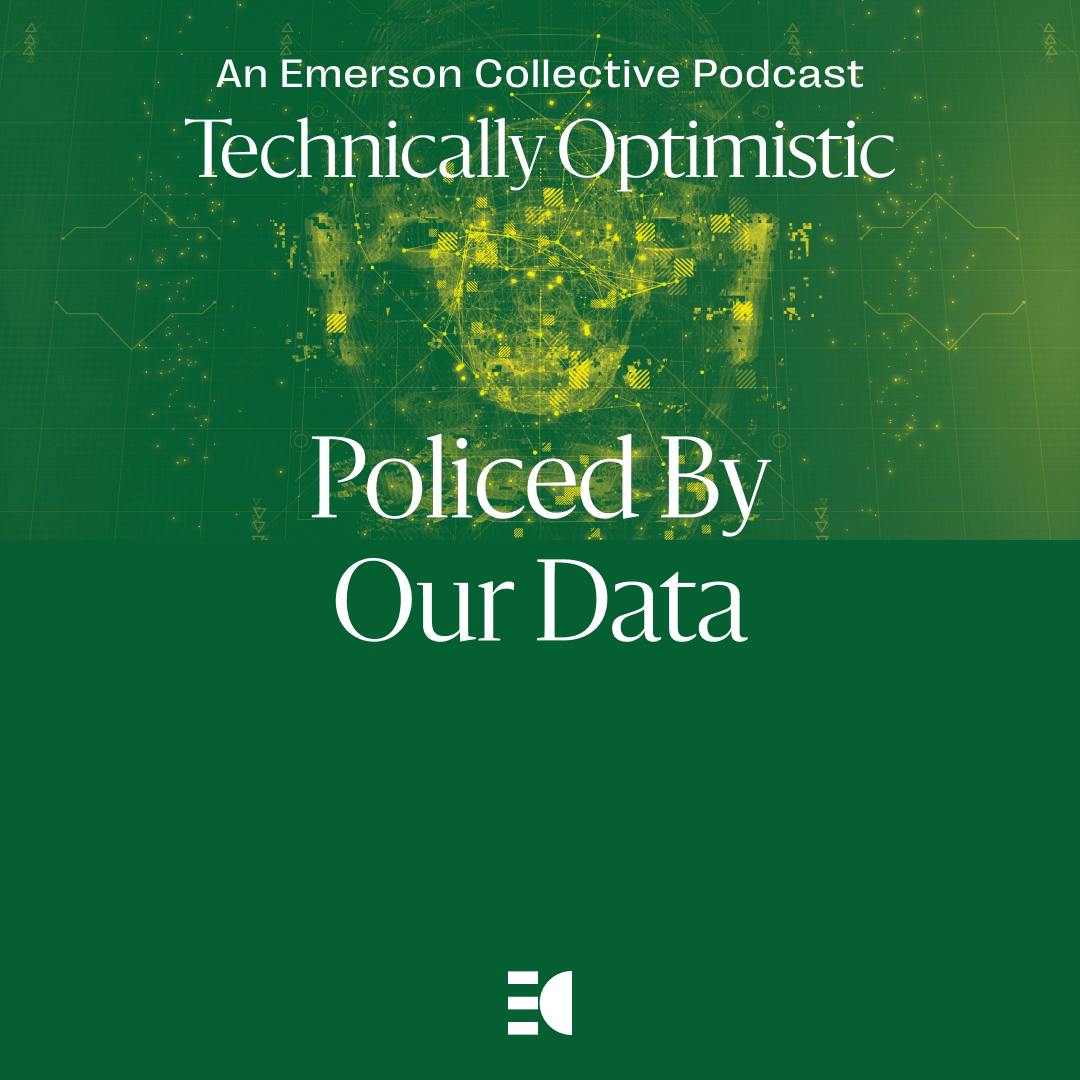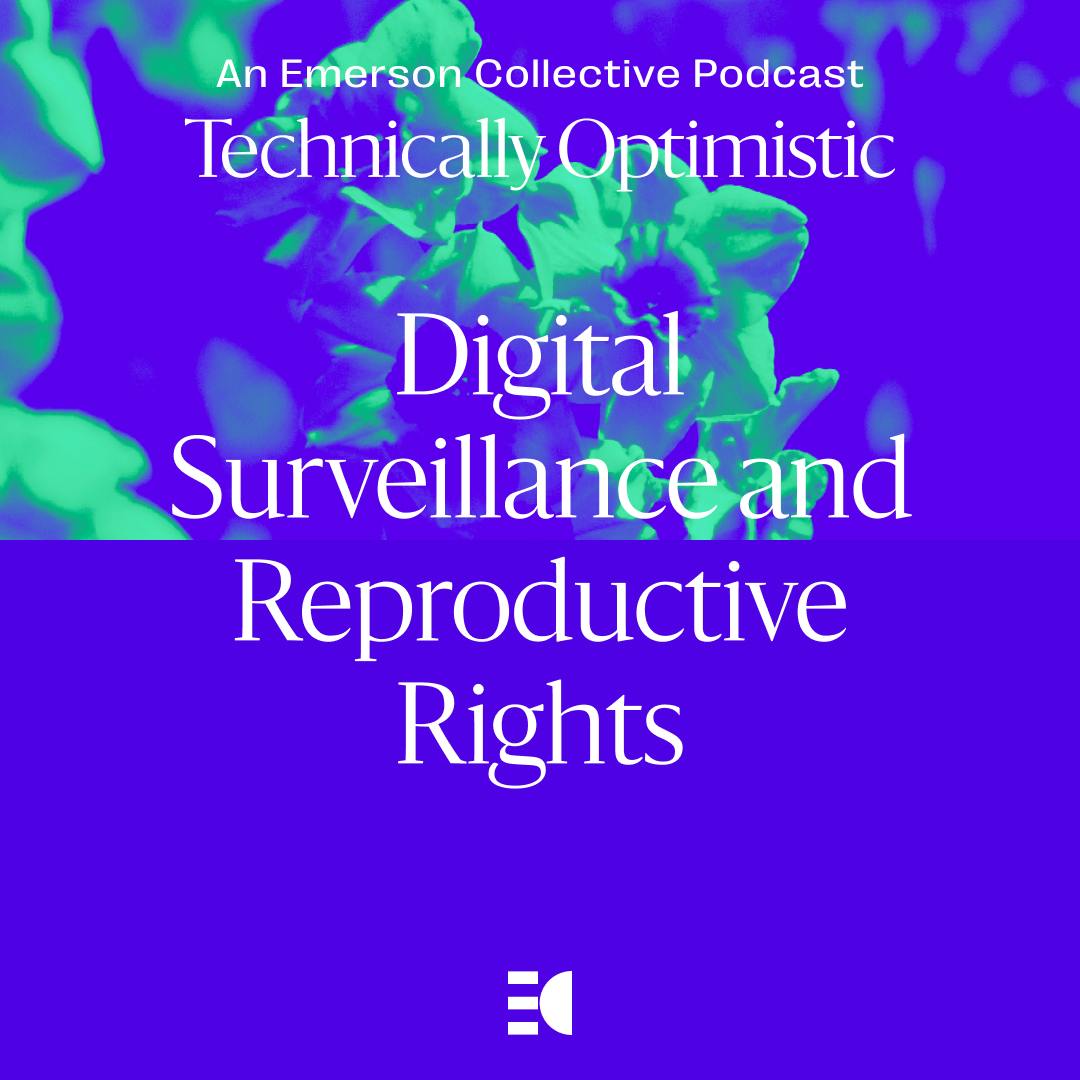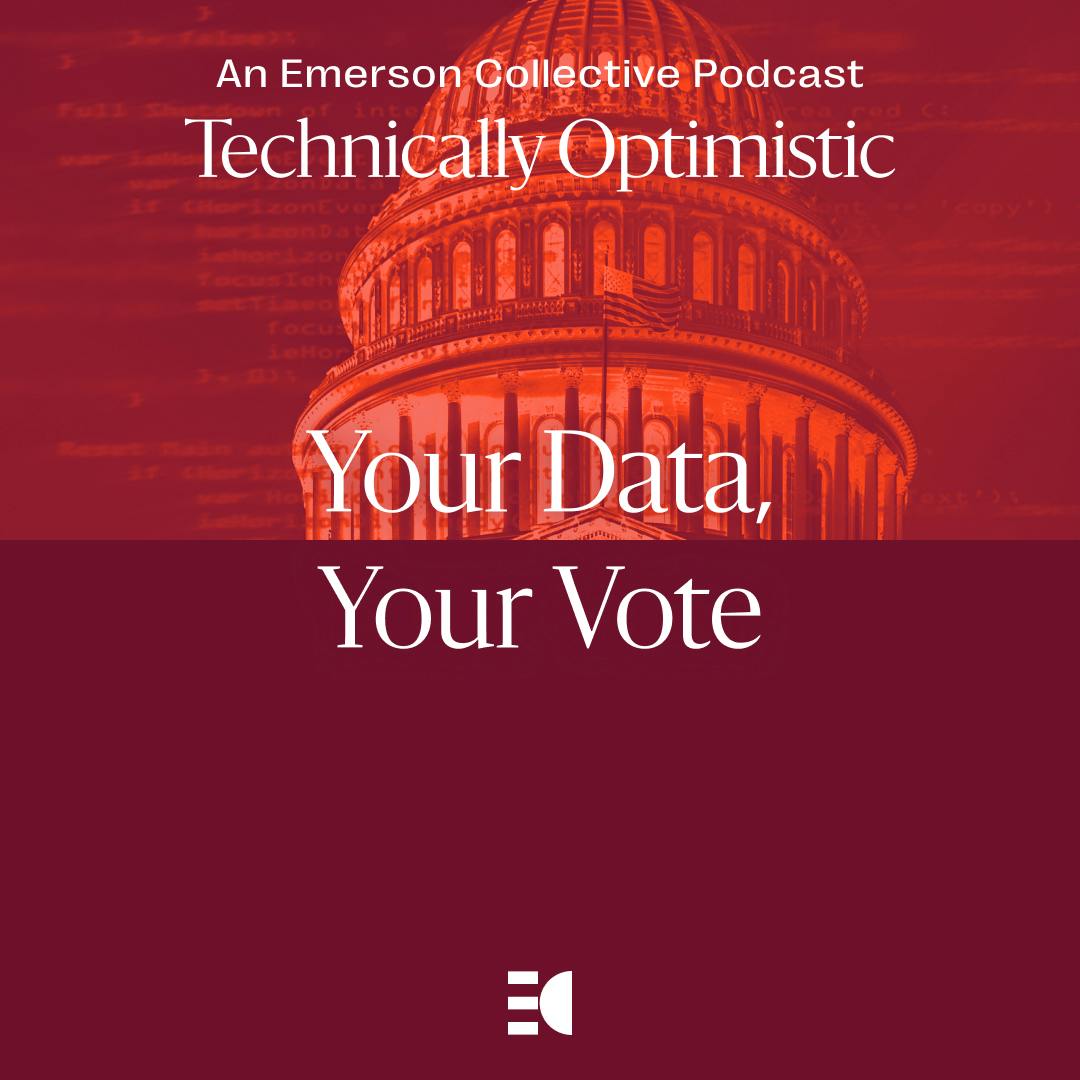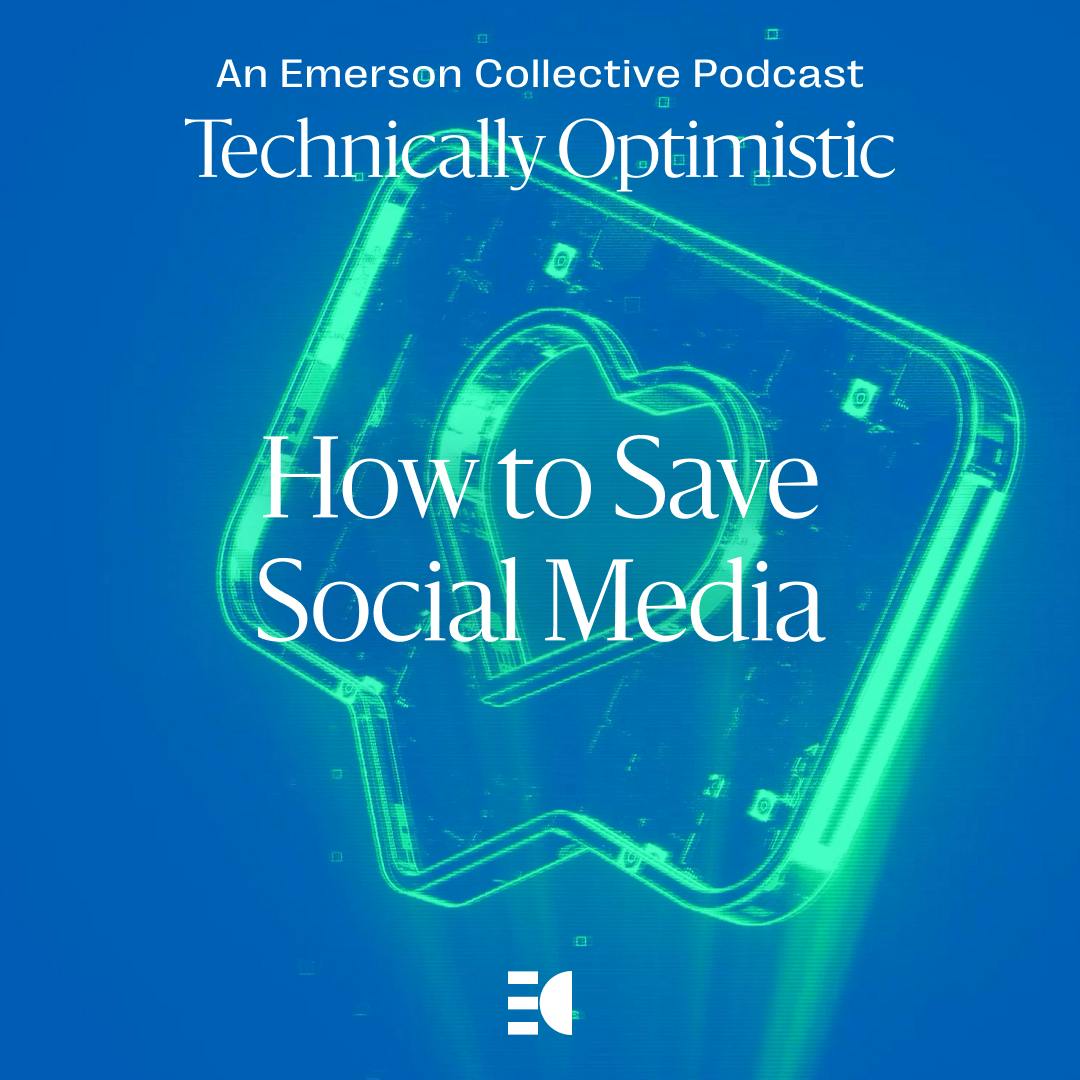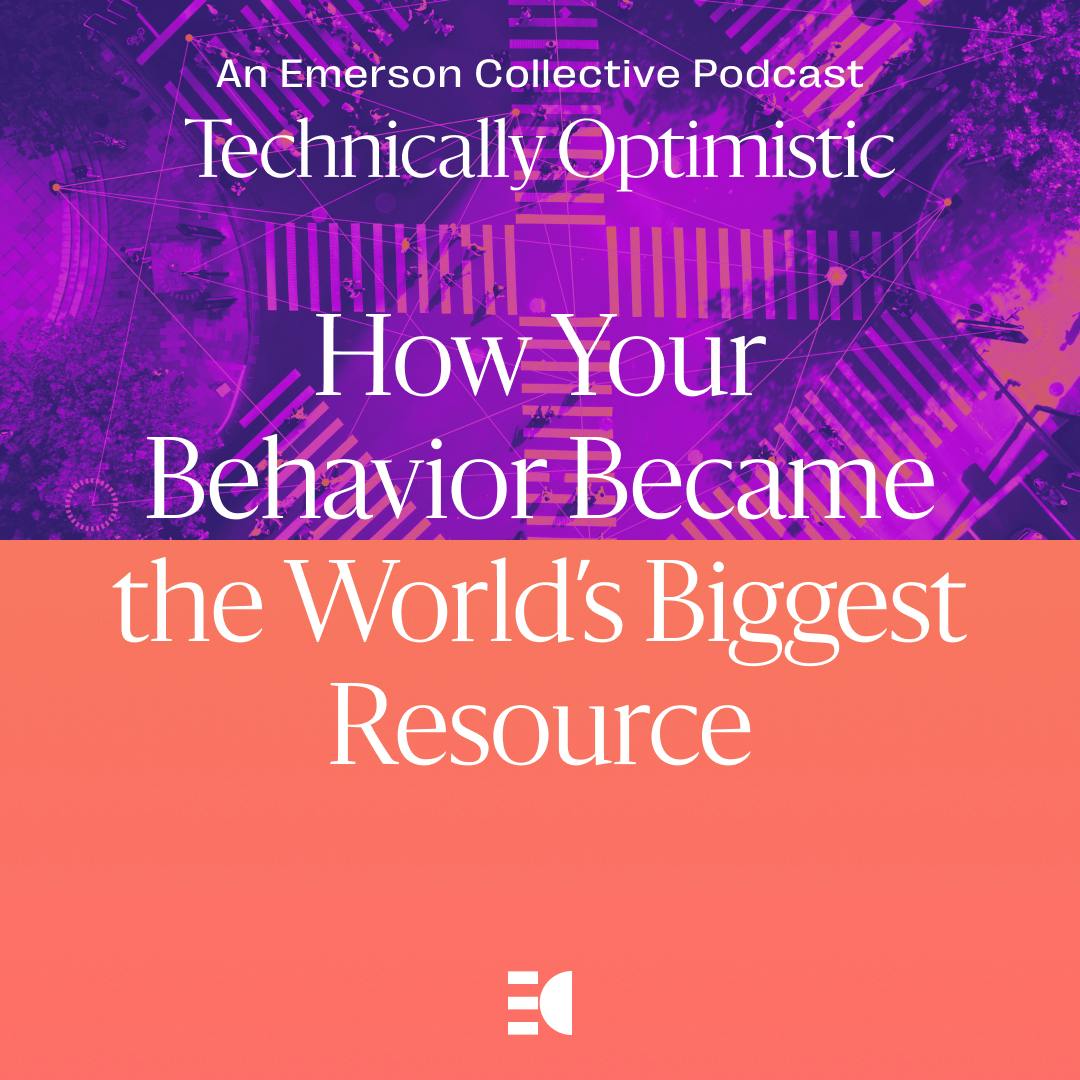Discover Technically Optimistic
Technically Optimistic

Technically Optimistic
Author: Emerson Collective
Subscribed: 75Played: 543Subscribe
Share
© Emerson Collective 2023
Description
Data is the most valuable resource on our planet, and the data economy impacts everything from mental health to human rights. On Season 2 of Technically Optimistic, host Raffi Krikorian engages engineers, activists, professors, and more to ask big questions about our data-driven era. How and why is our data being collected? How is it affecting our daily lives, our decision-making, our political systems? Perhaps most importantly, what does the future of data look like, and what can we do to help shape it? This season of Technically Optimistic is all about your data, and how you can gain back some control.
23 Episodes
Reverse
The way we use and understand data is rapidly evolving. So what does the future hold? Will backlash against surveillance capitalism result in protections that empower people to take control of their data? What’s going on with the new American Privacy Rights Act that’s currently moving through Congress? Raffi talks to experts about how we can understand — and help shape — the future of data, exploring new policy, digging into the concept of “digital doubles,” and assessing how data collection might play a role in coalition-building and reform.
Guests include Congresswoman Anna Eshoo (D-CA); Brandon Pugh, policy director at the R Street Institute; author and internet activist Cory Doctorow; actor and SAG-AFTRA member Clark Gregg; and Amy Bach, CEO of Measures for Justice.
To learn more about Technically Optimistic and to read the transcript for this episode: emersoncollective.com/technically-optimistic-podcast
For more on Emerson Collective: emersoncollective.com
Learn more about our host, Raffi Krikorian: emersoncollective.com/raffi
Technically Optimistic is produced by Emerson Collective with music by Mattie Safer.
Subscribe to our weekly newsletter: technicallyoptimistic.substack.com
Follow on social media @emersoncollective and @emcollectivepodcasts
Email us with questions and feedback at us@technicallyoptimistic.com
To learn more about listener data and our privacy practices visit: https://www.audacyinc.com/privacy-policy
Learn more about your ad choices. Visit https://podcastchoices.com/adchoices
The data boom has had an outsized impact on India and the Global South. This episode explores how the data economy has changed life on the ground in South Asia — and for tech workers in the US. What does the future of caste look like for the South Asian diaspora, and in the tech world at large? What can be done to mitigate the harms of caste discrimination? How can tech help resource marginalized populations, enable social mobility, and design a more sustainable, empowered future?
Raffi speaks with caste and technology scholar Murali Shanmugavelan; anthropologist Sareeta Amrute; Manu Chopra, CEO of Karya; Pratik Rajurkar, educator and co-founder of Polymath AI; and United Nations under-secretary-general, Amandeep Singh Gill.
To learn more about Technically Optimistic and to read the transcript for this episode: emersoncollective.com/technically-optimistic-podcast
For more on Emerson Collective: emersoncollective.com
Learn more about our host, Raffi Krikorian: emersoncollective.com/raffi
Technically Optimistic is produced by Emerson Collective with music by Mattie Safer.
Subscribe to our weekly newsletter: technicallyoptimistic.substack.com
Follow on social media @emersoncollective and @emcollectivepodcasts
Email us with questions and feedback at us@technicallyoptimistic.com
To learn more about listener data and our privacy practices visit: https://www.audacyinc.com/privacy-policy
Learn more about your ad choices. Visit https://podcastchoices.com/adchoices
Whether we like it or not, the kids are online — and they’re being tracked just like the rest of us. Who’s after their data, and why? We examine the harms minors face online — from how tech companies profit off addictive usership, to the consequences of social media on kids’ mental health and emotional development — and we explore some new proposals for how to protect their privacy. Are more parental controls the answer? Will newly-proposed laws be the key? Or will these bills cause more harm than good?
In this episode, Raffi is joined by U.S. Senator Richard Blumenthal (D-CT); author Rosalind Wiseman; Facebook whistleblower Frances Haugen; research fellow Tiera Tanksley; Jim Steyer, CEO of Common Sense Media; and Manmeet Dhindsa, attorney at the Federal Trade Commission.
To learn more about Technically Optimistic and to read the transcript for this episode: emersoncollective.com/technically-optimistic-podcast
For more on Emerson Collective: emersoncollective.com
Learn more about our host, Raffi Krikorian: emersoncollective.com/raffi
Technically Optimistic is produced by Emerson Collective with music by Mattie Safer.
Subscribe to our weekly newsletter: technicallyoptimistic.substack.com
Follow on social media @emersoncollective and @emcollectivepodcasts
Email us with questions and feedback at us@technicallyoptimistic.com
To learn more about listener data and our privacy practices visit: https://www.audacyinc.com/privacy-policy
Learn more about your ad choices. Visit https://podcastchoices.com/adchoices
New technologies, such as facial recognition, are being used by law enforcement to identify, locate, and convict people. Powered by data gathered from across the internet, these imperfect programs can sometimes get it wrong, resulting in wrongful arrests. Are these surveillance systems making us safer, or just the opposite? How can we conceptualize the relationship between data and criminal justice? Does the Fourth Amendment protect us from data-driven policing? And how can we maintain our own “cyber hygiene” to keep our data secure?
In this episode, Raffi talks to experts about these new technologies as they relate to our civil liberties, laws, and values. Guests include Kashmir Hill, New York Times privacy reporter and author of the book Your Face Belongs To Us; Jonathan Zittrain, Harvard professor and faculty director of the Berkman Klein Center for Internet and Society; Jennifer Lynch, general counsel at the Electronic Frontier Foundation; Jen Easterly, Director of the U.S. Cybersecurity and Infrastructure Security Agency; and Congressman Ted Lieu (D-CA).
To learn more about Technically Optimistic and to read the transcript for this episode: emersoncollective.com/technically-optimistic-podcast
For more on Emerson Collective: emersoncollective.com
Learn more about our host, Raffi Krikorian: emersoncollective.com/raffi
Technically Optimistic is produced by Emerson Collective with music by Mattie Safer.
Subscribe to our weekly newsletter: technicallyoptimistic.substack.com
Follow on social media @emersoncollective and @emcollectivepodcasts
Email us with questions and feedback at us@technicallyoptimistic.com
To learn more about listener data and our privacy practices visit: https://www.audacyinc.com/privacy-policy
Learn more about your ad choices. Visit https://podcastchoices.com/adchoices
Digital surveillance is becoming increasingly threatening to the reproductive rights of women and pregnant people in America after the fall of Roe v. Wade. Behavioral data collected from apps can be used to catalog — and criminalize — our health care choices. In this “wild west” surveillance economy, who is responsible for safeguarding our privacy? Could more and more of our data be weaponized against us in this same way? How can technology be harnessed to help protect privacy, rather than further jeopardize it?
Host Raffi Krikorian talks to people working to protect reproductive freedom in an ever-changing landscape. Guests include Sue Dunlap, the President and CEO of Planned Parenthood Los Angeles; Melanie Fontes Rainer, Director of the U.S. Department of Health & Human Services Office for Civil Rights; Kevin Williams, VP of digital products at Planned Parenthood; Amy Merrill, digital director and co-founder of Plan C; and Congressman Ted Lieu (D-CA).
To learn more about Technically Optimistic and to read the transcript for this episode: emersoncollective.com/technically-optimistic-podcast
For more on Emerson Collective: emersoncollective.com
Learn more about our host, Raffi Krikorian: emersoncollective.com/raffi
Technically Optimistic is produced by Emerson Collective with music by Mattie Safer.
Subscribe to our weekly newsletter: technicallyoptimistic.substack.com
Follow on social media @emersoncollective and @emcollectivepodcasts
Email us with questions and feedback at us@technicallyoptimistic.com
To learn more about listener data and our privacy practices visit: https://www.audacyinc.com/privacy-policy
Learn more about your ad choices. Visit https://podcastchoices.com/adchoices
Modern political campaigning has become a massive data operation. In the US, candidates from both parties frequently use data to try and better understand voters, in hopes of swaying them on election day. But how, exactly, is voter information being acquired, analyzed, and employed to influence voters? Do modeling and targeting really move the needle? And how are political campaigns a microcosm of the data economy, illuminating how data can transform society?
In this episode, Raffi talks to election veterans, data specialists, and former colleagues from his time as CTO at the Democratic National Committee, to talk about how data is utilized in campaigns. Guests include Dan Wagner, CEO of Civis Analytics; political consultant Max Wood; Lindsey Schuh Cortes, CEO of TargetSmart; and Tara McGowan, former political strategist & publisher of COURIER.
To learn more about Technically Optimistic and to read the transcript for this episode: emersoncollective.com/technically-optimistic-podcast
For more on Emerson Collective: emersoncollective.com
Learn more about our host, Raffi Krikorian: emersoncollective.com/raffi
Technically Optimistic is produced by Emerson Collective with music by Mattie Safer.
Subscribe to our weekly newsletter: technicallyoptimistic.substack.com
Follow on social media @emersoncollective and @emcollectivepodcasts
Email us with questions and feedback at us@technicallyoptimistic.com
To learn more about listener data and our privacy practices visit: https://www.audacyinc.com/privacy-policy
Learn more about your ad choices. Visit https://podcastchoices.com/adchoices
When social media is at its best, we get genuine human connection, built-in audiences, and exciting avenues for creativity and exchange. But our current social platforms are built on a surveillance model, where our data is used to predict our behavior, show us ads, and train the algorithms that keep us perpetually on the platform. It’s time to explore a new vision for social media, where we don’t have to give up on privacy in order to connect.
In this episode, Raffi talks to prominent critics of existing social media — and the people actively reimagining it, with truly private messaging, hyperlocal communities, and renewed sense of control over our own social data. Guests include Facebook whistleblower Frances Haugen, whose 2021 leaks made national news and put the social media giant in the Congressional spotlight; scholar and internet activist Ethan Zuckerman; Meredith Whittaker, the president of the Signal Foundation; Flipboard co-founder Mike McCue; and Harvard Law professor Jonathan Zittrain.
To learn more about Technically Optimistic and to read the transcript for this episode: emersoncollective.com/technically-optimistic-podcast
For more on Emerson Collective: emersoncollective.com
Learn more about our host, Raffi Krikorian: emersoncollective.com/raffi
Technically Optimistic is produced by Emerson Collective with music by Mattie Safer.
Subscribe to our weekly newsletter: technicallyoptimistic.substack.com
Follow on social media @emersoncollective and @emcollectivepodcasts
Email us with questions and feedback at us@technicallyoptimistic.com
To learn more about listener data and our privacy practices visit: https://www.audacyinc.com/privacy-policy
Learn more about your ad choices. Visit https://podcastchoices.com/adchoices
How has our data become the world’s most valuable resource? What privacy tradeoffs are we making when we engage with personalized apps, recommendations, and always-connected smart devices? Is our personal data being used to make things better, or to make tech giants even more powerful? And what do “cookies” have to do with all this?
Host Raffi Krikorian chats with experts about data’s role in AI, “big data” and the data economy, surveillance capitalism, and much more. Guests include AI researcher Amba Kak, executive director of the AI Now Institute; data scientist Chris Wiggins, co-author of How Data Happened; media scholar, tech writer, and internet activist Ethan Zuckerman; engineer and inventor of the cookie Lou Montulli; and Harvard professor Jonathan Zittrain.
To learn more about Technically Optimistic and to read the transcript for this episode: emersoncollective.com/technically-optimistic-podcast
For more on Emerson Collective: emersoncollective.com
Learn more about our host, Raffi Krikorian: emersoncollective.com/raffi
Technically Optimistic is produced by Emerson Collective with music by Mattie Safer.
Subscribe to our weekly newsletter: technicallyoptimistic.substack.com
Follow on social media @emersoncollective and @emcollectivepodcasts
Email us with questions and feedback at us@technicallyoptimistic.com
To learn more about listener data and our privacy practices visit: https://www.audacyinc.com/privacy-policy
Learn more about your ad choices. Visit https://podcastchoices.com/adchoices
The second season of Technically Optimistic is all about your data. Who’s taking it? What are they doing with it? And how can you gain back some control?
Join host Raffi Krikorian, CTO of Emerson Collective, down this road. It’s going to lead to some predictable places — like AI and social media — but also to stories about health care, political campaigning, and criminal justice reform.
Subscribe now! New episodes are coming soon.
To learn more about listener data and our privacy practices visit: https://www.audacyinc.com/privacy-policy
Learn more about your ad choices. Visit https://podcastchoices.com/adchoices
On Monday, October 30th, Biden signed a landmark executive order on artificial intelligence safety and security. It was timed strategically, released the same week as VP Harris gave a speech at a UK AI summit. And, in the absence of any Congressional action, Biden’s document represents the most comprehensive and official policy of the United States on AI at the moment.
So, what’s in the executive order? Host Raffi Krikorian speaks with journalist Courtney Rozen, who covers the White House and tech policy for Bloomberg, and Suresh Venkatasubramanian, a Brown University computer science professor who co-wrote the influential Blueprint for an AI Bill of Rights in 2022.
Sign up for the Technically Optimistic newsletter: technicallyoptimistic.substack.com
To learn more about Technically Optimistic: emersoncollective.com/technicallyoptimistic
For more on Emerson Collective: emersoncollective.com
Learn more about our host, Raffi Krikorian: emersoncollective.com/persons/raffi-krikorian
Technically Optimistic is produced by Emerson Collective with music by Mattie Safer.
Email us with questions and feedback at technicallyoptimistic@emersoncollective.com.
Subscribe to Emerson Collective’s newsletter: emersoncollective.com
To learn more about listener data and our privacy practices visit: https://www.audacyinc.com/privacy-policy
Learn more about your ad choices. Visit https://podcastchoices.com/adchoices
As AI rapidly advances, how do we balance speed and safety? Justin Hendrix is the CEO and Editor of Tech Policy Press, a nonprofit media and community venture covering the intersection of technology and democracy. Through his reporting and research, he’s got a lot to say about the global developments in AI regulation, including the AI Act in the EU, emerging efforts in the US, and the implications for the future of US-China relations.
On September 8th, Hendrix sat down with host Raffi Krikorian for a live Fellows Friday virtual event hosted by Emerson Collective. This episode is an edited recording of that event.
Sign up for the Technically Optimistic newsletter: technicallyoptimistic.substack.com
To learn more about Technically Optimistic: emersoncollective.com/technicallyoptimistic
For more on Emerson Collective: emersoncollective.com
Learn more about our host, Raffi Krikorian: emersoncollective.com/persons/raffi-krikorian
Technically Optimistic is produced by Emerson Collective with music by Mattie Safer.
Email us with questions and feedback at technicallyoptimistic@emersoncollective.com.
Subscribe to Emerson Collective’s newsletter: emersoncollective.com
To learn more about listener data and our privacy practices visit: https://www.audacyinc.com/privacy-policy
Learn more about your ad choices. Visit https://podcastchoices.com/adchoices
Timnit Gebru is a co-author of one of the most influential research papers on AI from this decade, which coined the term “stochastic parrots” to describe large language models. Following her very public departure from Google in 2020, Gebru founded the Distributed AI Research (DAIR) Institute, an organization that describes itself as doing independent, community-rooted work, free from the pervasive influence of Big Tech. She’s now DAIR’s executive director. And recently, she was selected as one of TIME’s 100 Most Influential People in AI — like several other guests you hear from in season one of this show.
Gebru sat down with host Raffi Krikorian for a wide-ranging and deep conversation about AI, touching on things like the obfuscation around its capabilities, what Big Tech hopes we don’t pay attention to, and the importance of imagining alternative possible futures.
To learn more about Technically Optimistic: emersoncollective.com/technicallyoptimistic
For more on Emerson Collective: emersoncollective.com
Learn more about our host, Raffi Krikorian: emersoncollective.com/persons/raffi-krikorian
Technically Optimistic is produced by Emerson Collective with music by Mattie Safer.
Email us with questions and feedback at technicallyoptimistic@emersoncollective.com.
Subscribe to Emerson Collective’s newsletter: emersoncollective.com
To learn more about listener data and our privacy practices visit: https://www.audacyinc.com/privacy-policy
Learn more about your ad choices. Visit https://podcastchoices.com/adchoices
In episode 6 of our first season on AI, we heard from Kyunghyun Cho, a professor of computer science and data science at New York University, about how artificial intelligence research in academia so often resembles corporate product development.
But in his initial talk with host Raffi Krikorian, Kyunghyun had a lot of other interesting things to say — for instance, about how AI models affect marginalized languages, on whether generative AI could produce something of cultural significance, and about the connection between AI “hallucinations” and creativity.
Here's Kyunghyun’s blog post on AI and compression (which references this piece in the New Yorker by Ted Chiang); and here’s more info on the “AI and Marginalized Languages” panel at the 2023 ICML.
To learn more about Technically Optimistic and to read the transcript for this episode: emersoncollective.com/technically-optimistic-podcast
For more on Emerson Collective: emersoncollective.com
Learn more about our host, Raffi Krikorian: emersoncollective.com/persons/raffi-krikorian
Technically Optimistic is produced by Emerson Collective with music by Mattie Safer.
Email us with questions and feedback at technicallyoptimistic@emersoncollective.com.
Subscribe to Emerson Collective’s newsletter: emersoncollective.com
To learn more about listener data and our privacy practices visit: https://www.audacyinc.com/privacy-policy
Learn more about your ad choices. Visit https://podcastchoices.com/adchoices
Ian Bremmer is a political scientist, risk consultant, and the author of “The AI Power Paradox,” a new essay in the Sept./Oct. 2023 issue of Foreign Affairs, co-written along with Mustafa Suleyman (co-founder of DeepMind and Inflection AI). In this essay, Bremmer lays out a plan for AI governance that aims to take into account a fundamental shift in the nature of political power that he says has been brought about by AI. He imagines a framework where nation-states, tech companies, and proposed newly created technocratic agencies all would join forces to try and mitigate the risks posed by AI.
Ian, who also appeared in episode 3 of our first season, sat down for a second conversation with host Raffi Krikorian to discuss his plan, and address some challenges. Is it appropriate to integrate private corporations and industry players so deeply as aids in their own regulation? How will this global framework prevent regulatory capture? And what, if anything, can be done about open-source AI models, not controlled by any state or private company?
To learn more about Technically Optimistic and to read the transcript for this episode: emersoncollective.com/technically-optimistic-podcast
For more on Emerson Collective: emersoncollective.com
Learn more about our host, Raffi Krikorian: emersoncollective.com/persons/raffi-krikorian
Technically Optimistic is produced by Emerson Collective with music by Mattie Safer.
Email us with questions and feedback at technicallyoptimistic@emersoncollective.com.
Subscribe to Emerson Collective’s newsletter: emersoncollective.com
To learn more about listener data and our privacy practices visit: https://www.audacyinc.com/privacy-policy
Learn more about your ad choices. Visit https://podcastchoices.com/adchoices
In August of 2023, wildfires on the Hawaiian island of Maui ripped through the historic town of Lahaina. Hundreds lost their lives, and thousands of structures were destroyed. The devastation is still unfolding. But this event was a tragic reminder that, for native Hawaiians, destruction of this magnitude did not just arrive out of the blue. These fires had a confluence of causes — like climate change, overtourism, and colonial mismanagement — and there have been many warnings.
Dr. Keolu Fox is a native Hawaiian geneticist, assistant professor of anthropology at UC San Diego, and co-founder and co-director of the Indigenous Futures Institute. He spoke to us in episode five about the important work he’s doing to restore ownership of medical and genetic data back to Indigenous people.
In light of the destruction of Lahaina, he sat down for a second conversation with host Raffi Krikorian. In this bonus episode, they discuss Keolu’s ideas for Indigenous-centered renewal — such as planet-friendly computing, an alternative to the resource-intensive data centers that power most AI. By joining local wisdom and new technology, Keolu can see a more sustainable future for Maui, Hawaii, and the world.
Read Keolu’s editorial in Science: “Hawai’i, from ashes to sustainability” (Aug. 24)
If you’d like to support the communities affected by the devastating Maui wildfires, you can make a donation to the Maui Strong Fund (hawaiicommunityfoundation.org), the Kāko’o Maui Fund (hawaiiancouncil.org), or the Maui Food Bank (mauifoodbank.org).
To learn more about Technically Optimistic and to read the transcript for this episode: emersoncollective.com/technically-optimistic-podcast
For more on Emerson Collective: emersoncollective.com
Learn more about our host, Raffi Krikorian: emersoncollective.com/persons/raffi-krikorian
Technically Optimistic is produced by Emerson Collective with music by Mattie Safer.
Email us with questions and feedback at technicallyoptimistic@emersoncollective.com.
Subscribe to Emerson Collective’s newsletter: emersoncollective.com
To learn more about listener data and our privacy practices visit: https://www.audacyinc.com/privacy-policy
Learn more about your ad choices. Visit https://podcastchoices.com/adchoices
Following our series on artificial intelligence, we are releasing a few bonus episodes. Hear extended interviews from voices we featured in the series, as well as new conversations with exciting guests you haven’t heard yet.
Up first: Bishop Paul Tighe is the Vatican’s Secretary for Culture and Education. His mandate is to engage with what humans are up to all over the world — and in this office he has developed an interest in AI. He talked with host Raffi Krikorian about why the Catholic Church has its eyes on Silicon Valley, the many ways that AI might affect humanity, and the things he thinks we need to hold onto as we head into the future.
To learn more about Technically Optimistic and to read the transcript for this episode: emersoncollective.com/technically-optimistic-podcast
For more on Emerson Collective: emersoncollective.com
Learn more about our host, Raffi Krikorian: emersoncollective.com/persons/raffi-krikorian
Technically Optimistic is produced by Emerson Collective with music by Mattie Safer.
Email us with questions and feedback at technicallyoptimistic@emersoncollective.com.
Subscribe to Emerson Collective’s newsletter: emersoncollective.com
To learn more about listener data and our privacy practices visit: https://www.audacyinc.com/privacy-policy
Learn more about your ad choices. Visit https://podcastchoices.com/adchoices
In the final episode of our limited series on AI, we look at the big issues of accountability and responsibility. How should we allocate the responsibilities for managing this technology? Who will decide when AIs are doing more harm than good? Will we be looking to private companies or depending on public servants? And what will be left for individual citizens to decide?
To help unlock solutions to the growing challenge of AI responsibility, host Raffi Krikorian speaks with Maria Ressa, Nobel Prize-winning journalist and co-founder of Rappler; scientist and inventor Rosalind Picard from MIT’s Media Lab; James Manyika, Senior Vice President of Research, Technology, and Society at Google; Kyunghyun Cho, Professor of Computer Science and Data Science at New York University; Stanford Internet Observatory Research Manager Renee DiResta; and Professor and data journalist Meredith Broussard. Together, they discuss different approaches to AI responsibility, and look at what the future could hold for ethical accountability.
To learn more about Technically Optimistic and to read the transcript for this episode: emersoncollective.com/technically-optimistic-podcast
For more on Emerson Collective: emersoncollective.com
Learn more about our host, Raffi Krikorian: emersoncollective.com/persons/raffi-krikorian
Technically Optimistic is produced by Emerson Collective with music by Mattie Safer.
Email us with questions and feedback at technicallyoptimistic@emersoncollective.com.
Subscribe to Emerson Collective’s newsletter: emersoncollective.com
To learn more about listener data and our privacy practices visit: https://www.audacyinc.com/privacy-policy
Learn more about your ad choices. Visit https://podcastchoices.com/adchoices
We often speak about the AI revolution as though it were something that might happen in the far future. But, what about today, when AI is modifying our culture, society, and the economy as we speak? In this episode, we consider how AI is currently creating massive shifts, and the potential benefits and challenges we face right now.
Is AI revitalizing the economy, or is it on track to displace countless workers? Will AI render filmmakers and writers obsolete, or are we at the beginning of a modern-day cultural renaissance? And is AI being used to help preserve Indigenous cultures, or is it a tool to harvest their data for corporate gain?
To address these questions, host Raffi Krikorian speaks with Erik Brynjolfsson, Director of the Digital Economy Lab; Justine Bateman, director, writer, producer and author; Ari Melenciano, artist and creative technologist; and Keolu Fox, assistant professor at the University of California, San Diego and co-founder and co-director of the Indigenous Futures Institute. Together, they chart a path to help us navigate AI in the current moment.
To learn more about Technically Optimistic and to read the transcript for this episode: emersoncollective.com/technically-optimistic-podcast
For more on Emerson Collective: emersoncollective.com
Learn more about our host, Raffi Krikorian: emersoncollective.com/persons/raffi-krikorian
Technically Optimistic is produced by Emerson Collective with music by Mattie Safer.
Email us with questions and feedback at technicallyoptimistic@emersoncollective.com.
Subscribe to Emerson Collective’s newsletter: emersoncollective.com
To learn more about listener data and our privacy practices visit: https://www.audacyinc.com/privacy-policy
Learn more about your ad choices. Visit https://podcastchoices.com/adchoices
Can we use AI as a tool that enriches learning, rather than replacing it? We're seeing AI rapidly revolutionize the classroom and it's poised to completely transform both education and learning itself. But, how can we also ensure that everyone has access to the basics of tech and AI literacy so that we can all, every one of us, reap the benefits of AI and understand its nuances?
In this episode, we explore the potential of AI to enrich learning, and discuss how we can ensure that everyone has the opportunity to benefit from this technology with student advocate Sneha Revanur; Sal Khan, founder of Khan Academy; Pat Yongpradit, Director of Education at code.org; Teemu Roos, professor at the University of Helsinki and leader of the AI Education program at the Finnish Center for Artificial Intelligence; and machine learning pioneer professor Tom Mitchell. Together, they discuss the ways in which AI will shape education—and future generations.
To learn more about Technically Optimistic and to read the transcript for this episode: emersoncollective.com/technically-optimistic-podcast
For more on Emerson Collective: emersoncollective.com
Learn more about our host, Raffi Krikorian: emersoncollective.com/persons/raffi-krikorian
Technically Optimistic is produced by Emerson Collective with music by Mattie Safer.
Email us with questions and feedback at technicallyoptimistic@emersoncollective.com.
Subscribe to Emerson Collective’s newsletter: emersoncollective.com
To learn more about listener data and our privacy practices visit: https://www.audacyinc.com/privacy-policy
Learn more about your ad choices. Visit https://podcastchoices.com/adchoices
The questions we face around who can govern AI are complex. If we want to reap the rewards of this technology, what – if any – regulatory solutions are needed to offer us the best outcomes? And who has the power to set these new rules in motion?
In Part 2 of this two-part episode of Technically Optimistic, we talk with the diverse thinkers who are proposing ways forward for AI governance and explore whether these solutions allow for innovative possibilities while also mitigating potential harm. What kinds of governance can we expect in the future, and how far from reality are our most idealistic proposals? Most importantly: is regulation even the best solution? To address these questions, host Raffi Krikorian talks to U.S. Senator Michael Bennet (D-CO); Tristan Harris, founder of the Center for Humane Technology; Congressman Jay Obernolte (R-CA); Phil Howard, Oxford professor and member of the International Panel on the Information Environment (IPIE); Ian Bremmer, author and political scientist; and Suresh Venkatasubramanian, professor of computer science. Together, they explore what it might mean to codify a regulatory system that creates safety without stifling ingenuity.
To learn more about Technically Optimistic and to read the transcript for this episode: emersoncollective.com/technically-optimistic-podcast
For more on Emerson Collective: emersoncollective.com
Learn more about our host, Raffi Krikorian: emersoncollective.com/persons/raffi-krikorian
Technically Optimistic is produced by Emerson Collective with music by Mattie Safer.
Email us with questions and feedback at technicallyoptimistic@emersoncollective.com.
Subscribe to Emerson Collective’s newsletter: emersoncollective.com
To learn more about listener data and our privacy practices visit: https://www.audacyinc.com/privacy-policy
Learn more about your ad choices. Visit https://podcastchoices.com/adchoices

